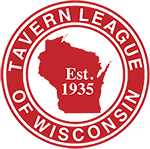After months of protracted debate, Congress finally delivered some – emphasis on “some” – aid to local bars and taverns struggling to keep their doors open ten months into the coronavirus pandemic with the passage of a long-overdue COVID-19 relief package at the end of December 2020. This is welcome news for Tavern League of Wisconsin (TLW) members, who will now be able to apply for additional Paycheck Protection Program (PPP) funding. The relief legislation also includes an expansion of the employee retention tax credit and the business meal tax deduction. There is also money to help struggling independent music venues, which will provide relief to a slice of the hospitality industry.
However, and despite advocacy by ABL and other hospitality industry groups, the relief package DID NOT include the RESTAURANTS Act, which would provide specifically designated grants to bars, taverns and restaurants. By omitting such an important piece of economic recovery puzzle, this relief package falls short, and does not provide the support needed to help save Main Street bars and taverns that have been among the hardest hit during the pandemic.
“Every bit of aid helps, but let’s be clear: this bill alone is not nearly enough to save America’s bars and taverns as we know them,” said American Beverage Licensees (ABL) Executive Director John Bodnovich. “Just as it did for the automobile industry during the Great Recession, Congress had the chance to provide a devastated industry a lifeline by passing the RESTAURANTS Act. Sadly, many local bars and taverns are now all but guaranteed to shutter their businesses, lay off their employees and leave a hole in their communities.”
As the coronavirus pandemic continues, bar and tavern shutdowns and operating restrictions are increasing, causing more of these local businesses to close their doors for good. Despite rising stock market indexes, the modest economic rebound experienced in recent months has been uneven across industries and not reflective of the state of the bar and restaurant business.
From March through December 2020, bar and restaurant sales of beer wine and spirits are expected to decline by $74 billion. This amounts to a loss of 52.7 million 12-ounce servings of beer; 3.3 billion 5-ounce glasses of wine; and 8.8 billion 1.5-ounce spirits cocktails. These staggering losses in beverage alcohol sales are accompanied by the loss of over 909,000 on-premise jobs and more than $24 billion in lost wages for bar and restaurant workers.[1]
“While not officially deemed ‘essential services’, bars and taverns are unquestionably essential for the millions of people they employ. We need them to be able to keep their doors open so they can lead what we hope is a strong economic recovery from the pandemic,” said Bodnovich.
Faced with a patchwork of closure orders and operating restrictions, bars, taverns and restaurants have taken unprecedented measures and spent thousands of dollars to makes sure they are keeping their customers and employees safe. Yet despite these diligent, good faith investments, many bar owners feel unfairly targeted and scapegoated by state and local governments that have failed to provide contact tracing evidence that shows that closing bars and restaurants is an effective means of COVID mitigation – especially when the alternative has often become large private parties and gatherings where no prevention measures or public safety regulations are enforced.
“While this relief package did not go far enough to adequately address COVID-19’s impact on the hospitality industry, bar and tavern owners will look to build on this step and continue to work with members of Congress, the White House and other hospitality industry groups to secure the pandemic relief that is needed to save America’s bar and tavern businesses,” said Bodnovich.
With the swearing in of the 117th Congress and the Biden Administration, a priority for White House and Congressional leadership is additional COVID-19 relief, which likely will be drafted and debated in the first few months of 2021. ABL will lobby for inclusion of targeted relief for bars and taverns – to include the reintroduction of the RESTAURANTS Act – as the legislative process gets underway. ABL will continue to coordinate with TLW leaders to make sure that TLW members’ voices are heard in Washington, DC and they receive much-needed assistance.
[1] John Dunham & Associates. American Beverage Licensees COVID-19 Impact Model. New York, September 2020.
